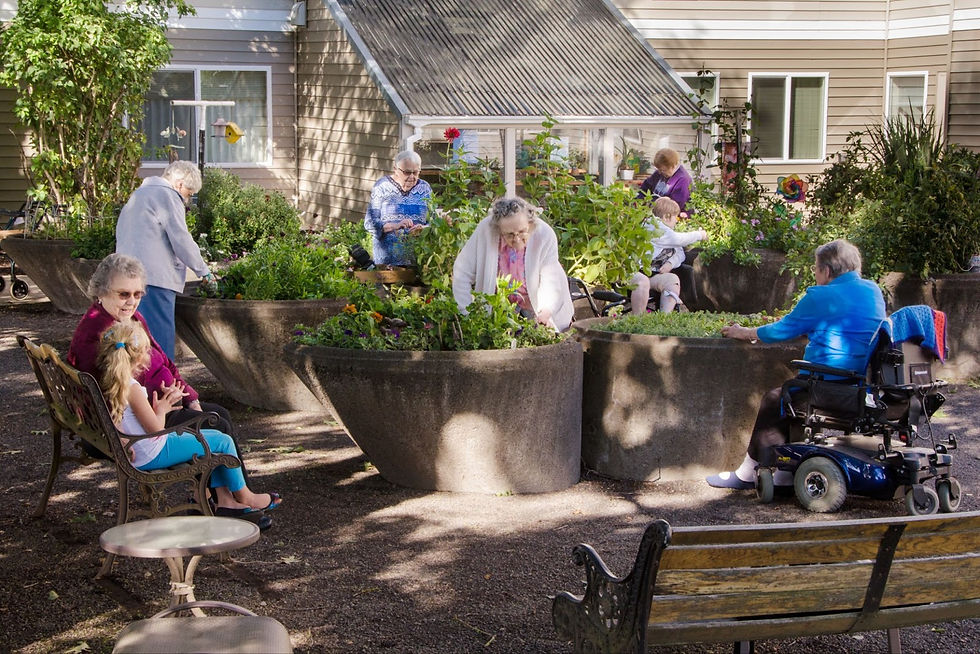7 Tips For Choosing the Right Memory Care Assisted Living Facility
- kirsten96724
- Mar 19, 2024
- 7 min read
Updated: May 21, 2024

Selecting the right memory care assisted living facility helps ensure the well-being and quality of life of your loved one who is experiencing memory issues. It's about finding a place where they will receive the specialized care and support they need to thrive in a safe and nurturing environment.
Families navigating the decision-making process for memory care face a myriad of challenges. From understanding the unique needs of their loved ones to researching and evaluating various facilities, the process is often overwhelming and emotional. Making the right choice requires careful consideration and thoroughly exploring available options.
This blog will discuss valuable tips to help you choose the ideal memory care assisted living facility for your loved one. From assessing needs and researching facilities to involving family members and seeking support, we'll provide guidance every step of the way to make this important decision a little easier for you and your family.
Assessing needs
When considering a memory care assisted living facility, it's essential to have a clear understanding of the specific care needs of your loved one. This involves assessing their cognitive abilities, daily living skills, and any medical conditions they may have.
Take note of tasks they may struggle with, such as bathing, dressing, or managing medications, as well as any behavioral or emotional challenges they may experience.
In addition to understanding their care needs, it's crucial to consider your loved one's preferences and lifestyle considerations. Think about their interests, hobbies, and routines. Do they enjoy socializing, participating in activities, or spending time outdoors?
Understanding their preferences will help you find a facility that aligns with their lifestyle and promotes overall well-being.
Be sure to consider factors such as the level of assistance required and medical needs. Determine if your loved one needs specialized care for conditions like Alzheimer's disease or dementia or if they require assistance with medical tasks such as medication management or monitoring chronic conditions.
Assessing these needs will guide you in finding a facility equipped to provide the appropriate level of care and support.
Researching facilities
Begin by exploring memory care assisted living facilities available in locations that are easily accessible to you and other family members. Utilize online resources, such as directories or search engines, to compile a list of potential facilities in the area. Consider factors like proximity to family members, accessibility to medical services, and the overall ambiance of the community.
Once you have identified potential facilities, take the time to evaluate their amenities, services, and programs. Look for facilities that offer specialized memory care services tailored to the unique needs of residents with cognitive impairments.
Assess the quality and variety of amenities, such as communal spaces, outdoor areas, and dining options. Ask about the availability of engaging activities and therapeutic programs designed to stimulate cognitive function and promote social interaction.
As you narrow down your options, you’ll want to review online reviews and ratings to gain insights into the experiences of current and past residents and their families.
Additionally, consider seeking recommendations from healthcare professionals, such as doctors or geriatric specialists, who may have insights into reputable facilities in the area.
Support groups for caregivers and individuals affected by memory-related conditions also provide valuable recommendations and firsthand experiences to aid in your decision-making process.
Visiting facilities

You’ll want to schedule visits to potential memory care facilities to get a firsthand look at their environment and services. Arrange tours with each facility to allow yourself ample time to explore and ask questions. Consider visiting during different times of the day to observe the atmosphere and activities.
Pay close attention to the environment, staff interactions, and resident engagement during your visits. Observe the cleanliness and organization of the facility, as well as the overall atmosphere.
Take note of how staff members interact with residents, including their level of attentiveness, patience, and compassion. Look for signs of resident engagement in activities and social interactions, which indicate a vibrant and stimulating community.
Don't hesitate to ask questions about the facility's care approaches, safety measures, and staff training. Inquire about the facility's philosophy of care and how it aligns with the specific needs of individuals with memory issues. Discuss what safety protocols are in place to prevent wandering and to ensure the security of residents.
Be sure to inquire about staff training and qualifications, including their experience in dementia care and any specialized certifications they may hold. Asking these questions will help you better understand the facility's commitment to providing high-quality care for residents with memory-related conditions.
Reviewing contracts and costs
Take the time to thoroughly understand the terms and conditions outlined in the contracts that the memory facility provides. Pay close attention to important details such as the duration of the agreement, services included, and any restrictions or limitations.
If any clauses or provisions are unclear, don't hesitate to ask for clarification from the facility's staff or management.
It's essential to clarify the costs, fees, and payment options associated with memory care assisted living. Inquire about the base monthly fee and any additional charges for specific services or amenities.
Discuss payment options, including private pay, long-term care insurance, and Medicaid coverage, to determine the most suitable arrangement for your financial situation. Be sure to ask about any potential fee increases in the future and how they will be communicated to residents and their families.
Transparency and accountability in financial arrangements are paramount when selecting a memory care facility. Seek assurances from the facility regarding their commitment to providing clear, detailed information about costs and fees. Request documentation or written agreements outlining the financial terms discussed during your consultations.
By ensuring transparency and accountability, you can feel confident that you are making an informed decision about the financial aspects of memory care for your loved one.
Considering the location and environment
When evaluating memory care facilities, it's important to consider the location and accessibility of each option. Assess factors such as proximity to family members, medical facilities, and other important amenities.
Also, consider the ease of transportation to and from the facility for residents and visitors. A convenient location enhances accessibility and makes it easier for loved ones to stay connected with their family members receiving care.
Take the time to carefully evaluate the physical layout, safety features, and overall ambiance of each memory care facility under consideration. Pay attention to details such as the layout of resident rooms and common areas, ensuring they are designed to accommodate the unique needs of individuals with memory issues.
Look for safety features such as handrails, non-slip flooring, and secure access points to prevent wandering and promote resident safety. The overall ambiance of the facility, including its cleanliness, décor, and atmosphere, can significantly impact the well-being and comfort of residents.
Assessing opportunities for outdoor activities and community integration is essential when choosing a memory care facility. Look for facilities that offer access to outdoor spaces such as gardens, walking paths, or courtyards where residents enjoy fresh air and nature.
Inquire about the facility's involvement in community events and programs that promote socialization and engagement among residents. A supportive community environment will enhance the quality of life for individuals with memory issues and foster a sense of belonging and connection.
Involving family and resident

Family involvement improves the decision-making process of selecting a memory care assisted living facility. Engage family members in discussions about the needs and preferences of the individual with memory issues. Consider their input when researching and visiting facilities, as they may offer valuable insights and perspectives.
Collaborating with family members ensures everyone is on the same page and that the chosen facility aligns with the collective goals and expectations.
Open communication with the individual with memory issues is essential throughout the decision-making process. Encourage discussions about their preferences, concerns, and desires for their living environment. Listen attentively to their input and involve them in the decision-making to the extent possible.
Providing them with a sense of agency and involvement may help alleviate anxiety and uncertainty about the transition to a memory care facility.
When making decisions about memory care assisted living, it's essential to consider the preferences and comfort level of the resident. Take into account their individual likes, dislikes, and routines when evaluating different facilities. Keep their unique needs and personality traits in mind to ensure that the chosen facility can provides a supportive and nurturing environment where they feel valued and respected.
Trusting instincts and seeking support
You always want to trust your instincts and intuition when assessing memory care facilities. Pay attention to your gut feelings and first impressions during visits. If something doesn't feel right or if you have concerns, it's crucial to further explore those and seek clarification. Your instincts will often guide you in making the best decision for your loved one's care.
Seeking advice and support from healthcare professionals, social workers, or geriatric care managers will provide valuable insights and guidance during decision-making. These professionals have experience working with seniors and can recommend reputable memory care facilities based on their expertise.
Don't hesitate to reach out to them for assistance and advice tailored to your loved one's specific needs.
Recognize the importance of ongoing communication and advocacy for the resident's well-being once they are settled into a memory care facility. Stay actively involved in their care by maintaining regular communication with the facility staff, attending care meetings, and advocating for their needs and preferences.
By remaining engaged and proactive, you’ll ensure your loved one receives the personalized care and support they deserve while residing in the memory care facility.
Cottage Glen Assisted Living and Memory Care

Selecting the right memory care assisted living facility is a significant decision that requires careful consideration. Following the tips outlined in this blog will ensure that your loved one receives the high-quality care and support they deserve in a nurturing and comfortable environment.
If you're seeking a reputable memory care facility that prioritizes personalized care, engaging activities, and a supportive community, look no further than Cottage Glen Assisted Living and Memory Care. Located in Tooele, Utah, Cottage Glen offers comprehensive memory care services tailored to meet each resident's unique needs.
Schedule a visit to Cottage Glen today to experience the warm and compassionate care our caring team of experts provides firsthand. Your loved one's well-being and quality of life are our top priorities, and we look forward to welcoming them into our community.
.png)




Comments